Schedule
(Click on the host's name to read a Q&A blog post)
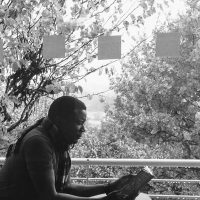
Kọ́lá Túbọ̀sún ( @kolatubosun)
My name is Kọ́lá Túbọ̀sún (I began to put diacritics on my name as a permanent feature in 2015 after we released the free tonemarking software for Yorùbá/Igbo for Mac and Windows). I am a linguist and creative writer (with interest in travel writing, journalism, and poetry). I’m currently a Miles Morland Scholar, working on a nonfiction book, while leading a team at YorubaName.com working on a couple of language, lexicography, and documentation tools, and another at Google working on Natural Language Processing.
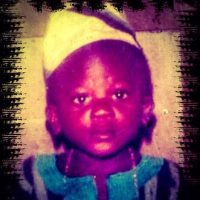
Ọmọ Yoòbá ( @yobamoodua)
Adéṣínà Ayẹni otherwise known as Ọmọ Yoòbá is a journalist and cultural advocate who took up the socialization function of the media through the preservation, dissemination and transmission of the Yorùbá cultural heritage both online and offline. As a voice over artist, he has produced uncountable Yorùbá advertisements for Nigeria radio campaigns and TVC. He's the founder of Yobamoodua Cultural Heritage, a platform dedicated to the propagation of the Yorùbá language and culture. Ọmọ Yoòbá is also the língua manager for the Global Voices Yorùbá site. He is a Yorùbá language instructor on tribalingua.com where he has tutors students all over the world. He has also worked with Localization Lab, an international community of volunteer translators and end users, developers and intermediaries who work together to translate and localize digital security and circumvention tools. Ọmọ Yoòbá has written a book titled: Ẹ̀yà Ara Ẹ̀dá Ọmọ Ènìyàn, a compilation of labeled diagram of the anatomy and morphology of the human body and herbs that work wonders on each parts of the body. He is a research fellow of the Firebird Foundation for Anthropological Research.
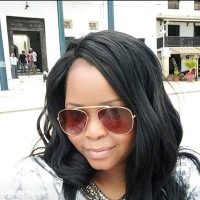 April 4-10:
April 4-10:
Zaituni Njovu ( @Zaituni_Njovu)
My name is Zaituni Njovu from Dar es salaam, Tanzania. My background is in Education and Information Technology. I am a founder of the Zaina Foundation in Tanzania, and our organization empowers women in technology. Our current projects are digital security awareness and digital rights in different groups of women and human rights defenders in Tanzania. We are also partners with Localization Lab in translating some of technological tools into the Swahili language. We recently finished translation of the Signal mobile app into Swahili and now we are working on localizing the Tor Browser.
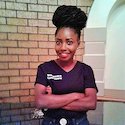 April 11-16:
April 11-16:
Ursula Zage ( @ZuZage)
I am a researcher, a writer, a Wikipedian and the Co-founder of Global Open Initiative (GOI) Foundation, a non-profit organization whose goal is to help make knowledge and data freely accessible to everyone. While the use of indigenous languages are on the decline, GOI Foundation is passionate about the prospects of Wikimedia projects serving the purpose of language preservation platforms that anyone could edit. Interventions currently undertaken include: Incubating languages that do not yet exist on Wikipedia, expanding existing languages that are currently experiencing dwindling levels of participation, and recruiting expert local languages writers to become volunteers.
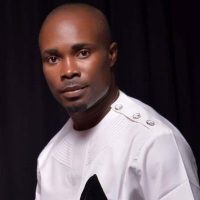 April 17-23:
April 17-23:
Ezeibe Emeka Francis ( @emekaezeibe)
My name is Emeka Ezeibe from Anambra State Nigeria.I am a Transport/Logistics consultant currently working with a Key Transporter to Nigerian Breweries PLC and AB-InBev Nigeria. Though I come from an Engineering background, a bitter experience from childhood propelled me to become passionate about the propagation and preservation of the Igbo language using technology. I am the founder of @Umu_Igbo, a Twitter handle that seeks to promote the Igbo language, Culture, Excellence, Innovations and Proverbs.
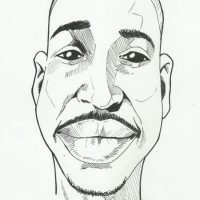 April 24-30:
April 24-30:
Adebayo Adegbembo ( @technobayo)
I'm Adebayo Adegbembo, from Lagos, Nigeria. I'm the lead developer at Genii Games. I love the process that goes into making ideas come alive, hence my work with Genii Games among other things I'm involved in.
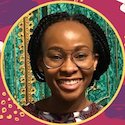 May 1-7:
May 1-7:
Mama Adobea Nii Owoo ( @AdobeaO)
My name is Mama A. Nii Owoo. I also write under a pseudonym Naa Oyoo Owoo which is my ethnic and ancestral name. My ethnic language is Gã. Gã is the indigenous language of natives from Accra, Ghana. In addition to GãDangme, I speak a number of languages: Akan (Ghanaian language, English, Spanish and French. I am curious about the kind of implementational spaces that educators can open or closed for indigenous languages to thrive. I love teaching and have worked with students of all age levels in Ghana, Cuba, the USA, Spain and Canada. I have also worked as a Translator in Spain at the Universidad de Sevilla International Center in Spain. Currently, I am studying for a Ph.D. in Language & Literacies Education at the Ontario Institute for Studies in Education. My research interests lie in language policy and how educators’ language experiences inform the way they implement mother-tongue based bilingual education policy for students.
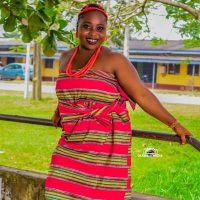 May 8-14:
May 8-14:
Damilola Adebonojo ( @iyayoruba )
I am Dámilọ́lá Adébọ́nọ̀jọ (aka Ìyá Yorùbá), a Yorùbá Language Specialist, Culture Enthusiast, and Tone-mark Activist. For few years now, I have worked with a number of individuals and organizations on Translations, done Subtitles for a number of Yorùbá movies, coupled with voice-overs and taught Yorùbá Language online and offline. I am also the founder of Alámọ̀já Yorùbá, the Independent Yorùbá Language Service Provider that provides different Linguistic services and teaches Yorùbá Language on social media on a daily basis. My first translated English novel, “Out of His Mind“, one of Bayo Adebowale's best selling novels will soon be published in Yorùbá.
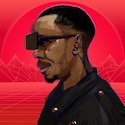 May 15-21:
May 15-21:
Siya Masuku ( @siyamasuku )
Soweto-born Siya Masuku ran a 113% successful online crowdfunding campaign in July and August 2016 to launch his own publishing platform, Siyafunda Online. The alphabet book, Siyafunda: isiZulu (2016), has colourful images of lino printed animals. It is available with English translations in print and digital formats. Siya has collaborated with Book Dash South Africa to illustrate children’s books; UDaisy Omangalisayo (2015) and Isitsha Samakhekhe Masiwe (2016). He recently collaborated with Puku Children’s Literature Foundation to illustrate and design the books, Mosidi (2019) and The Wolf and the Fox (2019). A recipient of the David Koloane Arts Writing Award (2017), Siya is a self-published comics writer and illustrator of uNjabulo: emkhathini (2017) and uLanga (2019).
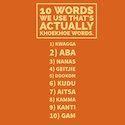 May 22-28:
May 22-28:
Denver Toroxa Breda ( @ToroxaD )
Khoe languages and cultural Kuwiri or activist, writer advocating for the officialisation of Khoekhoe and N|uu, two of SA's First languages.
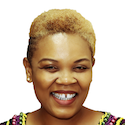 May 29-June 4:
May 29-June 4:
Blossom Ozurumba ( @blossomozurumba )
I am Blossom Ozurumba and several people call me Blossom while very few people call me Asampete which can be loosely translated from Igbo language to mean “the pretty one.” I am excited about Igbo language and culture and is committed to ensuring that several folks become literate in some or all of speaking, writing and reading. I am a founding member of the Igbo Wikimedians User Group and will most likely start a conversation about the Wikimedia Foundation without prompting. I live in Abuja, Nigeria and love the calm and unhurried feel of the city.
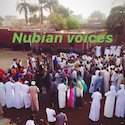 June 5-11:
June 5-11:
Doaa Farid Farah AbdelSayed ( @TheNubianVoices)
I am a Nubian Egyptian journalist living in Cairo. I launched an initiative in July 2018 called “The Nubian Voices”. The initiative aims to give Nubians an opportunity to speak up, because Nubians are underreported in mainstream media. We focus on the Nubian Language and efforts to keep it. We feature all Nubian projects, startups and organizations that keep conversations about Nubia going.
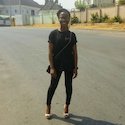 June 12-18:
June 12-18:
Tochi Precious ( @TochiPrecious3)
My name is Tochi Precious Friday (Adaugo), a multi-linguist, founder of Smarter Languages Academy, one of the founding members of Igbo Wikimedians User Group and a German language teacher.
 June 19-25:
June 19-25:
Ibrahima Malal Sarr ( @ibrahimasaar)
I am a linguist, web developer and programmer from Senegal. I am also a former Mozilla Rep and a member of ANLOC (African Network for Localization). As a long term Mozillian and Fulah localization team lead and a SUMO and KB l10n contributor, I have created most of Fulah Internet and IT terminology from scratch. I was a part of the incredible team of Reps present at Mobile World Congress (MWC) 2015, reporting the event in social media. I studied Applied Linguistics, Translation, and Computer Assisted Language Learning at Moray House College in Edinburgh, Scotland. I feel like I am a true “indigenous geek” who is passionate about making technology available in my own language, Fulah (ff). I have been involved in Fulah language translation and localization, as well as promoting the language on the Internet (www.pulaagu.com and www.blog-pulaagu.com ). In 2009, I led Fulah teams in the 100 African Language Locales initiative. I also created most of the Fulah terminology for ICT, especially Firefox terminology. I feel that my biggest achievement yet is the localization of Firefox into Fulah, which was released in June 2012. Since that time, Firefox OS has also been localized into Fulah, making it the first African language to have fully localized the new OS.
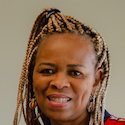 June 26- July 2:
June 26- July 2:
Mpumie Njobe ( @MpumieNjobe)
After spending many years in the corporate environment in a variety of positions from administrative to executive, I decided to venture into teaching. In 2010 I obtained a Certificate for Teaching English to Speakers Of Other Languages Certificate. In 2011 I joined the WLS team as an IsiZulu trainer and administrator. I led and managed the team that taught IsiZulu at Goldfields Mining using the communicative language teaching approach developing IsiZulu training material, CDs and DVDs for IsiZulu lessons. I led the team that developed isiZulu and Sesotho picture dictionaries. In 2013 I joined the African, Asian and European Unit where I continued to develop IsiZulu teaching material. I hold a BA Honours Degree in Translation & Interpreting from Wits University, and am studying a Master’s Degree in Translation. In January 2019, I established Learn EzeeZulu a company specialising in facilitating speaking of isiZulu within business environment.
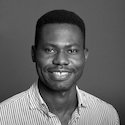 July 3-9:
July 3-9:
Mahuton Possoupe ( @b_mahuton)
I am Mahuton Bienvenu POSSOUPE. Mahuton means “The one who belongs to God” in Fon. Fon is the most spoken national language in Benin. My parents are from the Ouémé Valley and speak Wéme, a language I can understand well, but cannot speak really well. But as I was born and grew up in Fon communities, I can easily speak and understand Fon as most Fon people. I am a software developer and e-commerce specialist. In addition, I am a volunteer Mediawiki developer since 2018. Mediawiki is the software that supports wiki projects like Wikipedia. Since 2014, I edit Wikipedia, documenting my country, its culture and its people on Wikipedia. I am a founding member of Beninese Wikimedians User Group and support new contributors from Benin at the starting point of their volunteering journey. In 2018 during a Wikimedia Hackathon in Barcelona, I started a Wikipedia in Fon with the support of people from the Wikimedia Foundation. I am now organizing a Fon community of volunteer contributors in Benin.
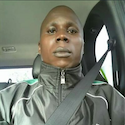 July 10-16:
July 10-16:
Bonface Witaba ( @bswitaba)
I am a writer, local content developer and advocate, trainer, researcher, and consultant in Internet Governance and policy matters. I am the pioneer of ICANNWiki Swahili, an encyclopedic website whose mission is to develop, translate, and localize 10,000 Internet Governance articles and glossary into Swahili for the 150 million Swahili speakers by 2020. Additionally, I run a Youth Internet governance capacity building initiative aimed at mentoring students, academics, as well as individuals working in the private sector and; or government, through professional courses on the topic of Internet Governance, in efforts to help them understand its ecosystem
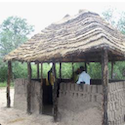 July 17-23:
July 17-23:
Davy Ndlovu ( @NdlovuDavid)
My name is Davy Nlovu and I'm from Zimbabwe. My language group is Tjwao of the Tjwa or San people of Southern Africa. I'm a language activist. I have developed abilities in Khoisan languages and cultural research, documentation and revitalization. I am also a writer and have experience in historical documentation and compilation. I work at peace building, customer service management, and consultancy management. I am a good team player and have good organizational abilities.
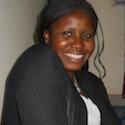 July 24-30:
July 24-30:
Kpénahi Traoré ( @kpenahiss)
I'm Kpénahi TRAORÉ, I was born in the Ivory Coast, but I am from Burkina Faso. I'm the editor-in-chief of RFI mandenkan, the Bambara-language newsroom at Radio France Internationale (RFI). It is a great experience for me to work at this language, because before I thought it was not possible or very difficult to do journalism in Bambara. vSamogo is my mother tongue, even if I grew up with the language called Dioula in the Ivory Cost and in Burkina Faso. Malians call it Bambara, Guineans say Malinke, some people say Mandingo.
July 31-August 6:
Christian Bwaya ( @bwaya)
I am an editor and volunteer translator for Global Voices in Swahili. I joined Global Voices in 2009 and translator hundreds of posts into Swahili. I work at Mwenge Catholic University, Tanzania as a lecturer in social psychology and early childhood education. I also work as a consultant in child protection and safeguarding to defend children against all forms of abuses. I write weekly columns in Tanzania daily about parenting, language and learning and social behaviors. I am passionate about Swahili growth on line and that explains why I consistently use Swahili in all my digital writing.
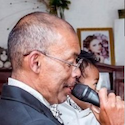 August 7-13:
August 7-13:
Andriamifidisoa Ny Haja Zo ( @jentilisa)
My full name is Andriamifidisoa Ny Haja Zo known online as Jentilisa. There was a time I wrote intensively on diaries so that my brother gave me advice to create a blog and I did, I am still a blogger and I won a 2007 Best of Malagasy Blog (on Malagasy language category) organized by Foko-Madagascar. One of the jury wrote on her blog that seeing and reading on my blog posts I should be a journalist. I write mainly in Malagasy. But before that, during my childhood, I had a passion to read some old papers in Malagasy of early twentieth century that was under French colonization. Maybe it was the reason why I like the language of my ancestors. I am a Translation Manager for Global Voices in Malagasy. I was invited by a fellow citizen to join Global Voices in 2007 and I have been translating thousands of posts since then.
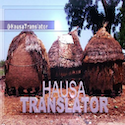 August 14-20:
August 14-20:
Mazhun Idris ( @HausaTranslator)
I am a freelance localization professional, a sociolinguist, and a web search analyst with fifteen years of career. I am both an entrepreneurial and volunteer linguist with several media and tech organizations. I am a bilingual author and editor, who published academic research on Hausa orthography and Nigerian social media spaces. With a degree in economics and proficiency certificates in Hausa and Arabic languages, I was previously an executive in a media communication firm in Nigeria. I have also served as supervisor and cultural adaptation specialist for content marketing, advert placements, TV, radio programs, and social media blogs. I was once the a Country Advisor for CIRF Project by Zephyr Institute in Washington DC, where I advised on religious freedom online advocacy targeting Hausa-speaking West Africa, and managed the project’s Hausa language social media channels for one year. I am a member of American Translators Association, and the Nigeria Institute of Translators and Interpreters.
 August 21-27:
August 21-27:
Adaobi Anukwu ( @ada_onyenkuzi)
My name is Adaobi Anukwu, born and raised in Lagos, Nigeria. A professional accountant, entrepreneur, and Igbo Language activist. I picked up interest in promoting the Igbo Language when I noticed a decline in the level of interest in the language, particularly among the younger generation. The Igbo language is registering fewer and fewer speakers and that prompted me to take up the task of creating awareness of the language as well as promoting the culture.
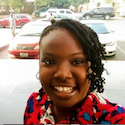 September 4-10:
September 4-10:
Ozurumba Uzoma Ihechiluru ( @uzomaozurumba)
My name is Uzoma Ozurumba Ihechiluru; I am an Architect and a public servant in Nigeria. I am an open knowledge advocate and activist; a co-founder of Igbo Wikimedians User Group. The Igbo Wikimedians User Group is an affiliate of the Wikimedia Foundation that is committed to working on various Wikimedia projects related to Igbo language and culture.
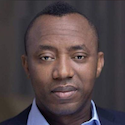 September 11-17:
September 11-17:
Kingsley Oluchi Ugwuanyi ( @KingsUgwuanyi)
I teach English linguistics in the Department of English and Literary Study, University of Nigeria, Nsukka (currently on study leave). My main research interests include sociolinguistics, Nigerian English, world Englishes, applied linguistics, and (sometimes) Nigerian literature. I am currently undertaking my doctoral research on Nigerian English at Northumbria University, Newcastle upon Tyne, UK. I have BA in English and literary studies and MA in Applied Linguistics (Teaching English a second language) both from the University of Nigeria, Nsukka.
 September 18-24:
September 18-24:
Sam Oyeyele ( @samoyeyele)
I became a Wikipedia editor in 2011, due to my keenness in wanting to share the knowledge that I have. Since I joined the movement, my main aim has been to solve the content gap and the systemic bias on the internet about Nigeria, and the African continent at large. Over the years, my participation in the movement has grown to be broad and multifaceted, with the need to take on community leadership roles in different capacities and scope. In 2015, I started the Nigerian Wikimedia Affiliate, along with 3 other community members and I was in charge of Outreach efforts for the affiliate for more than 3 years. I have organized events, workshops, campaigns, contests, etc, at the national level, in order to get Nigerians to know more about Wikipedia/Wikimedia and to contribute to it in different ways that they can, including in their local languages. I recently started a continental project, called “The AfroCine Project“, which has been involved in solving this content gap problem through African cinema, theatre and Arts. We aim to get content around this topic area to be readily available online and to be easily accessible in different formats and languages.
 September 25-October 1:
September 25-October 1:
Justin Sègbédji Ahinon ( @justinahinon1)
My name is Justin Sègbédji Ahinon. Actually, only a few people know that Sègbédji is also my name, so for most, I'm just Justin Ahinon. I've felt the need to use Sègbédji regularly and tell it to people asking my name about 2 years ago. I've studied Applied Statistics and Economics. And currently I'm fixing the web (aka working web/digital projects stuffs) at Sèmè City, a special economic zone in Benin offering incentives for investment and job creation through higher education, scientific research and incubation of innovative business; while I was not initially supposed to have a career in software/web engineering. I'm also involved in some open science/open access initiatives in Benin and in Africa, such as AfricArxiv, a digital repository for Africa/African specific contents, AfricaOSH, a gathering of people to promote open science & hardware on the continent, or Idemi Africa, an initiative to reinforce the presence of contents in African languages on the web.
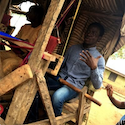 October 2-8:
October 2-8:
Aremu A. Adeola Jr. ( @aremuadeolajr)
My name is Aremu Anuoluwapo Adeola jr., I'm an undergraduate student of the Department of Linguistics, African and Asian Studies, University of Lagos. I'm the creator of the First African Indigenous crossword game, YOOBA LINGO. I also intern at Yorubaname.com as a lexicographer and also the Founder of Aremu Language Consult.
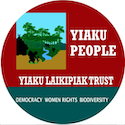 October 9-15:
October 9-15:
Moffat Kihoro ( @yiakupeople)
I am from the indigenous Yiaku community and a projects person at Yiaku Laikipiak Trust (YLT) which is a community based organization that fights for the rights of the almost extinct tribe of Yiaku which dwells in the Mukogodo Forest of Laikipia County, Kenya.
Since its inception, YLT has been trying to preserve the language, culture, and habitat of the tribe which over time has extensively been assimilated to the Maasai community of the region (Laikipia North Constituency, Laikipia County). I thrive to apply acquired skills, knowledge, and experience to develop strategies for gender mainstreaming, minority and special groups rights; equity and equality for all individuals and groups in society and involvement of all in decision making and resource management.
